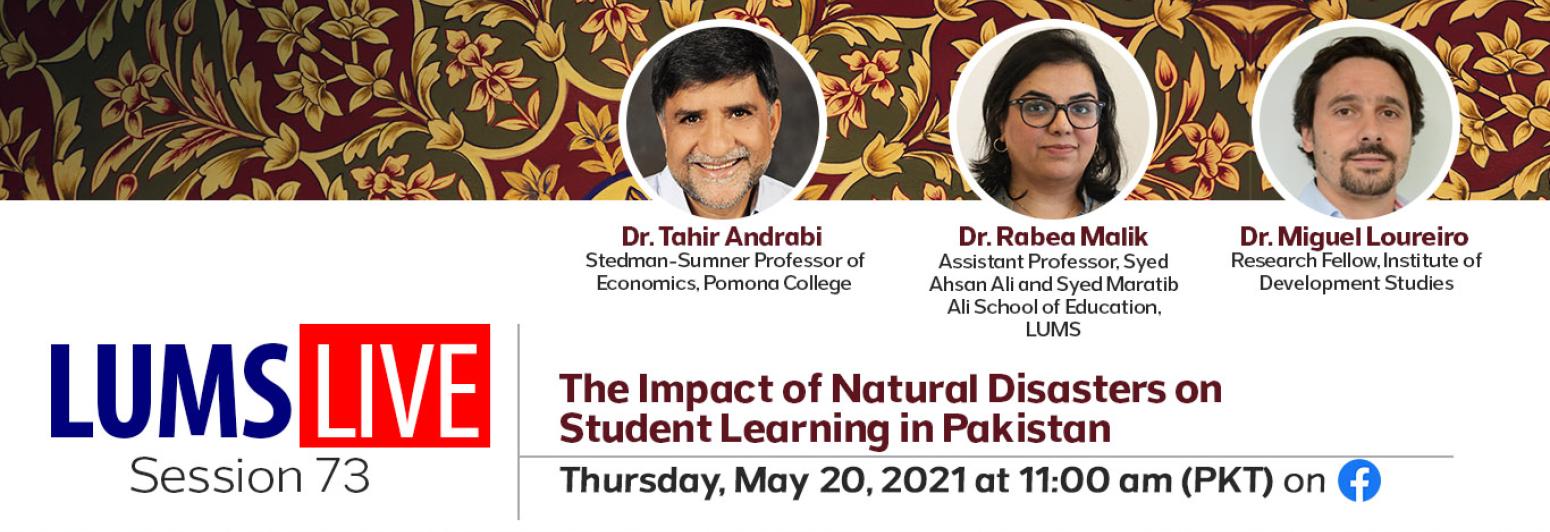
May 20, 2021
Professor Tahir Andrabi, Stedman-Sumner Professor of Economics at Pomona College, will analyse the impact of the 2005 Earthquake in Pakistan on the recovery of student learning outcomes. He will examine the implications of these findings for the risks posed by the COVID-19 pandemic to student learning outcomes. Dr. Andrabi has published extensively in major economics and education journals including the American Economic Review and Review of Economics and Statistics. His research interests include the economics of education and development economics.
Date: Thursday, May 20, 2021
Time: 11:00 am (PKT)
Venue: Facebook Live
Hosted in collaboration with the Mahbub ul Haq Research Centre (MHRC), as part of their Mahbub ul Haq Distinguished Lectures 2021, this session will be moderated by Rabea Malik and Miguel Loureiro.
Join us for this insightful conversation!
Profiles of Panelists
Dr. Tahir Andrabi:
Dr. Andrabi is Stedman-Sumner Professor of Economics at Pomona College. He has been a visiting scholar at the Massachusetts Institute of Technology, a research associate at the London School of Economics and a consultant for the World Bank. He is also Co-founder and Director, Social Policy and Public Goods Program, Center for Economic Research Pakistan and served as the inaugural Dean of the Syed Ahsan Ali and Syed Maratib Ali School of Education at LUMS from 2017 to 2020.
Dr. Andrabi is the principal investigator (PI) on the four-year longitudinal study (LEAPS) on quality of primary education in rural Punjab funded by the World Bank and the National Science Foundation. He is also the PI on a National Academy of Sciences/Higher Education Commission, Pakistan grant on evaluating the recovery from the 2005 northern Pakistan earthquake.
In 2007, his work on religious education in Pakistan received the George Bereday Award for the best paper published in Comparative Education Review in 2006 from the Comparative and International Education Society.
Dr. Rabea Malik:
Dr. Malik is a Research Fellow and CEO of the Institute of Development and Economic Alternatives, with over 10 years of experience in empirical mixed methods research in Pakistan. Her expertise lies in the application of sociological and political economy frameworks to questions of exclusion, school governance and service delivery in education.
She has led research projects on marketisation of primary education, public private partnerships, school-based management, inclusive education and effective teaching. She was the country Co-investigator in Pakistan for Teaching Effectively All Children, and was the technical lead for the evaluation of the Punjab Education Sector Program II.
Dr. Malik is currently undertaking a study on bureaucratic practice and delivery in education in Punjab and Sindh, using qualitative retrospective comparative methods. She has published on inequality in education, teaching practices and marginalisation in government classrooms, and the experiences of learning for children from marginalised backgrounds.
Dr. Miguel Loureiro:
Dr. Loureiro is a Research Fellow at the Institute of Development Studies, primarily analysing and improving state-citizen relations.
He works at the state-citizen interface both from a citizens’ perspective, examining accountability and empowerment relations, and the state’s perspective, identifying opportunities for state responsiveness. From the citizens’ side, his research focuses on what happens when poor and marginalised households interact with public authorities, the role of intermediaries, and barriers to women’s empowerment. From the state side, he studies moments when the state listens to its citizens, elements of bureaucratic capacity that contribute to better policy outcomes, and the impact of recent autocratisation patterns on inclusive policy making.



















